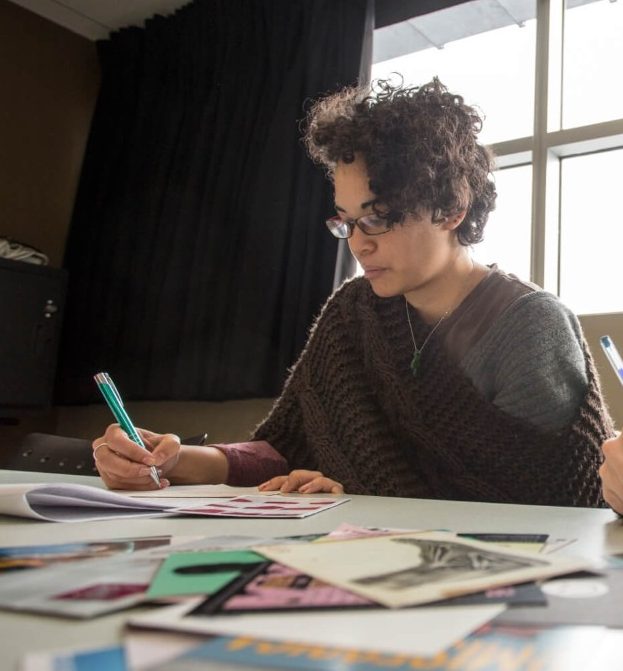Communication
Studies (GrDip)
Develop new skills, launch a career
Our Graduate Diploma in Communication Studies attracts engaged and motivated individuals from Canada and other countries. The program is ideal for those who are looking to switch careers or enhance their expertise in media production and theory. Applicants do not need prior academic or production experience in Communication Studies.

Hands-on experience
The program offers specialized production courses in sound, video, and intermedia using state of the art facilities. Students can take elective courses in feminist media studies, popular culture and other subjects taught by our experienced and dedicated faculty and can opt for a credited internship. Our full-time program can be completed in three terms (fall, winter, summer), making it ideal for individuals looking to return to full-time work within a year.

Bridge Classroom Learning to Career Success
Our program has an outstanding alumni network who have gone on to successful media-related careers in marketing, public relations, teaching, film, freelance media, journalism and more. Concordia offers excellent career planning to help our students thrive. The degree serves as an ideal foundation for further studies and our Diploma graduates apply to MA programs at Concordia and beyond.
Explore your future:
internship opportunities
Work in the communications media field of your choice under the supervision of the BA & Diploma Internships Director and a media professional while you're completing your diploma!
- Fill out the application forms
- Identify an internship and an on-site supervisor
- Fill out the one-page write up about your motivation for doing this internship
- Get the signatures from your on-site internship supervisor
- Submit to the department in a timely manner, before your internship begins
- CBC Montreal
- CKUT Campus/Community Radio
- Art souterrain
- Rock Camp for Girls Montreal
- Just for Laughs
- Picture This
- Pop Montreal
- Studio de musique ancienne de MTL
- Fantasia Film Festival
- Radio-Canada
- INFORMACTION
- Essentrics
- Musée McCord Museum
Are you ready to submit your application?
- Application form and Fee
- Curriculum Vitae (CV)
- Three Letters of Reference and assessment forms
- Transcripts for all post-secondary institutions attended
- Proof of Canadian citizenship (if applicable)
- Applicants whose primary language is not English, are required to submit official language test scores, unless exempted.
Your application also contains a statement of purpose (600 words maximum), with the following:
- a description of your academic and professional background and how this has led to your decision to apply
- how this program might advance academic and professional goals
- courses in our program which are of particular interest to you
- why you are an ideal candidate for this program
- why you are choosing this particular program
Learn more on the letters of reference, assesment form, transcripts and proof of Canadian citizenship required for submitting your application.
Featured Alumni

Aileen McBride,
Graduate Diploma 1995
Aileen McBride is an Emmy, Canadian Screen and Gemini award winning editor and producer. She has worked in independent film, documentary and investigative journalism. Her work includes the multiple award-winning documentary, Made in Bangladesh (2014), a fifth estate investigation into the Canadian connection to dangerous working conditions for garment workers, and Chasing the Cancer Answer (2006), probing rising cancer rates. She is currently Senior Editor at CBC's The National.

Alexandre Franchi,
Graduate Diploma 1995
Alexandre Franchi is a screenwriter, film director, and producer with 20 years of practice. His films explore myth, fantasy, and humor as a means of coping with trauma. He is best known for his films The Wild Hunt (2009) that won the Best Canadian First Feature, Happy Face (2018), and Quest for Communitas (2023), that explores "playing" with one's own anxieties and oppressions to create transformative narratives.

Philip Szporer,
Graduate Diploma 1982
Writer, lecturer, and filmmaker Philip Szporer teaches at Concordia University. He is a recipient of a Pew Dance/Media Fellowship (UCLA), the Jacqueline Lemieux Prize (Canada Council of the Arts), and Concordia’s Fine Arts Distinguished Teaching Award. Philip co-directs the award-winning media arts production company, Mouvement Perpétuel, and Dance+Words, an initiative to expand and encourage conversations around cultural discourse.

Hannah Deasy,
Graduate Diploma 2014
Hannah Deasy is a communications professional based in Ireland. Since studying at Concordia, she has worked for the non-profit Women for Election and led communications for the Institute of International and EU affairs, an EU and international affairs think tank. She is currently head of member communications for Fórsa, Ireland’s leading public service trade union. Outside of her working day, she campaigns to elect progressive women in Ireland.

Elana Wright,
Graduate Diploma 1995
“My year-long experience in the Communication Studies graduate diploma program set me on the path to an exciting 20 year career (so far!) in media relations, advocacy and institutional communications. Many of the students in my year became both my close friends and a great network of other communications professionals who are working in television, marketing, public relations and journalism. The graduate diploma was definitely a game-changer for me!”
Support our students
Support our Diploma program that offers both hands-on training and theory. Our goal is to help students develop skills to identify meaningful jobs and to take on complex issues such as AI ethics, environmental challenges and structural oppressions.
Your donation will help ensure our students are working with state of the art facilities, get hands-on experience, have a chance to meet with professionals and establish the networks they need to succeed.
Contact us
Vanessa Pizzichemi, Graduate Program Assistant
Alessandra Renzi, GrDip Director

